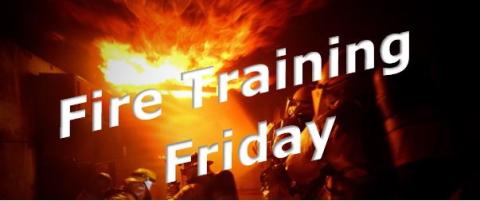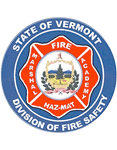
If you have previoulsy registered for one of our online courses, but do not remember your password, CLICK HERE and use the "Forgot Password" feature.
Courage, Passion, and Leadership
Vermont Fire Academy Instructor Pete Holmes discusses the common attributes of great firefighters and provides some resources that you can use to help develop yourself into the firefighter that you want to be. View presentations from some of the most respected fire service speakers from across the country in this collection of resources. Watch this discussion and receive lots of great resources to take your firefighting knowledge to the next level.
What Can We Learn from the Mayday
Vermont Fire Academy Instructor Micah Genzlinger presents a review of the Southwest Supermarket Fire that resulted in over a dozen MAYDAY calls, injured four firefighters, and took the life of Firefighter Bret Tarver. This fire could easily happen in any of our Vermont communities and Instructor Genzlinger reviews many of the factors that contributed to this tragedy in an effort to prevent a repeat incident. Watch his narrated presentation, a video detailing the fire incident, and review the NIOSH report findings to help prevent future tragedies in your department.
Micah Genzlinger joined the fire service in 1997 and became a career firefighter with the South Burlington Fire Department in 2000, a Lieutenant in 2005, and a Captain in 2017. He has been an Instructor with the Vermont Fire Academy since 2012 and assisted with the creation and implementation of our Rapid Intervention Crew course.
Defining Your Leadership Style
Your leadership style is a combination of your personality, your life experiences, your communication style, your decision-making preference, your emotional intelligence, and your overall perspective and way of thinking. Leadership style can be defined in numerous ways and the most simplistic and common definition refers to the manner in which an individual leads others.
This course explores the pillars of leadership and provides resources to explore and identify various differing leadership styles. Students will take an assessment to identify their preferred leadership style and learn steps to inspire others to higher performance.
This course is presented by Vermont Fire Academy Specialist Instructor Mariah Whitcomb. Mariah is the Deputy Chief of the Thetford Volunteer Fire Department, an Advanced EMT, and an EMS Instructor Coordinator. She is an accomplished professional curriculum developer and specializes in adult education.
Sharpen Your Size-Up
Whether you are an officer within your department or not, you could find yourself as the first responder on the scene of a building fire. A strong size-up and initial report are an important tool in planning a successful fire attack. In this course, you will watch actual fire scene video to sharpen your thinking skills as you roll up on a building fire and then perform a size-up and an initial report.
This course is presented by Vermont Fire Academy Instructor Jon Weiss. Jon is the Chief of the Pawlet Fire Department.
Firefighter Rehabilitation
Summer is here and we often think about firefighter rehabilitation as the temperatures start to climb, but isn't it something that we should be thinking about and doing all year long? Firefighter over-exertion is a significant contributing factor to Line of Duty Deaths, but we can work to prevent those with an effective Rehabilitation Program. This course will explore the facts of why it is important to have and follow firefighter rehabilitation programs, it will provide resources that outline best practices, and provide you with sample polices and equipment lists to help you build an effective rehabilitation program.
This course is presented by Vermont Fire Academy Specialist Instructor Mariah Whitcomb. Mariah is the Deputy Chief of the Thetford Volunteer Fire Department, an Advanced EMT, and an EMS Instructor Coordinator. She is an accomplished professional curriculum developer and specializes in adult education.
Four-Gas Metering for Firefighters
This program reviews the proper use of the 4-gas meter. The training encompasses the two types of meters most often encountered by firefighters. An explanation of the 4 gases monitored and their respective dangerous levels is explained. Other technical subjects discussed are, sensor relative response, cross sensitivities, lag times, reading ranges, alarm set points, calibration, and bump test. The student will learn the correct procedure for monitoring a suspect atmosphere and action steps to take when the device alarms. Case studies are utilized to reinforce both the use of the meter and its limitations.
This course is presented by Vermont Fire Academy Instructor Robert Morlino. Robert is the Assistant Chief of the Pawlet Volunteer Fire Department and a technician with the Vermont Hazardous Materials Response Team. Robert’s 36+ years in the chemical industry included positions as a senior chemist up to executive levels with a responsibility for a broad range of chemical products.
Beyond the Textbook Building Construction: Timberframes
Timberframes are a common building type in many of Vermont's villages and rural areas. Effective fire suppression demands a strong understanding of building construction. In this program, we get inside the walls of a common type of building in Vermont, the historic timberframe. We’ll learn what these buildings are, how we can recognize them in a size-up and discuss what makes fire suppression in these buildings different.
This course is presented by Vermont Fire Academy Instructor Jon Weiss. Jon is the Chief of the Pawlet Fire Department.

